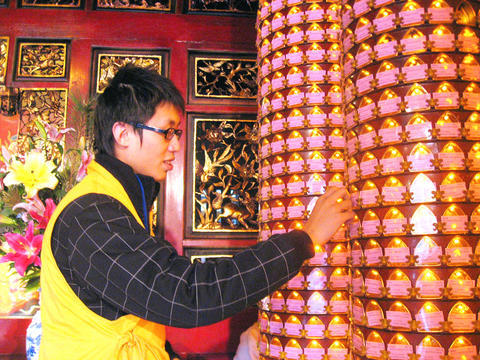Hordes of Taiwanese swarm to temples around the country before and during the Lunar New Year to pray for good luck.
But now, with the help of technology, those seeking the attention of local deities can use the Internet, ATM machines and even cellphones to connect with the gods.
A number of telecommunication companies, banks and convenience stores have launched "virtual lantern-lighting" and "virtual Taisui-pacifying" services that enable people too busy to visit temples in person to perform the rituals elsewhere.

PHOTO: CNA
Taisui (
In the Year of the Rat, which starts today, people born under the sign of the rat or horse are considered to have offended the Taisui and must therefore pacify Ying Ban, the Taisui of 2008.
Chunghwa Telecom, Taiwan Mobile Co, Far EasTone Telecommunications Co and Asia Pacific Telecom Co are working with the 300-year-old Matsu Tianhou Temple (
indispensable
The companies are seeking to capitalize on local adherence to Taoist tradition, in which "pacifying Taisui and "lighting the lantern" are indispensable rituals.
Lighting lanterns, such as the "Lantern of Light," the "Safety Lantern" and the "Education Lantern," are thought to bring health, honor and a brighter future.
Worshippers can use their mobile phones to log on to the Internet and enter their name, birth date and address to pacify Taisui or light a lantern. Fending off the rage of Taisui costs NT$600, while the cost of lighting lanterns depends on the temple. The Matsu Temple in Lugang charges NT$600 to light a "Lantern of Light."
Customers of Far Eastern International Bank and Chinatrust Commercial Bank can use the companies' Web sites or ATM machines to perform the ritual, while others can fill out the appropriate forms available at convenience stores and submit them by fax or via the Internet.
Lu Ming-sen (
"No matter where you are, hold on to your faith and the gods will bless you," he said.
traditionalists
For most traditionalists, going to temples to experience the entire process of pacifying Taisui or lighting a lantern is a very important event.
Longshan Temple (龍山寺), a temple founded in 1738, is the most popular place for pacifying Taisui in Taipei, as well as being a local cultural landmark. The government designated the temple as a second-grade historical site in 1985 to ensure that it would be preserved.
The temple in Taipei's Wanhua District (
Chang Hsue-lin (張雪玲), director of temple affairs, said that the management had to limit applications to pacify Taisui to 1,000 per day owing to difficulties processing the massive number of applications.
"Although the temple considered launching a Web site for people to apply online, we dismissed the idea amid concerns about security and the accuracy of personal information," she said. "Besides, if we allow people to pacify Taisui by applying over the Internet, all of the openings might be fully booked within one day, which is not fair for those who come to the temple in person."
Chang said Longshan Temple's 100,000 lanterns of light have all been sold to devotees. For those who still want to light a lamp, the temple set up two colossal "safety lanterns" on Lunar New Year's Eve for the general public.
The service is free and will run until March 26, the birthday of Kuan Yin Bodhisattva, she said.

The Ministry of Education (MOE) is to launch a new program to encourage international students to stay in Taiwan and explore job opportunities here after graduation, Deputy Minister of Education Yeh Ping-cheng (葉丙成) said on Friday. The government would provide full scholarships for international students to further their studies for two years in Taiwan, so those who want to pursue a master’s degree can consider applying for the program, he said. The fields included are science, technology, engineering, mathematics, semiconductors and finance, Yeh added. The program, called “Intense 2+2,” would also assist international students who completed the two years of further studies in

Former president Tsai Ing-wen (蔡英文) departed for Europe on Friday night, with planned stops in Lithuania and Denmark. Tsai arrived at Taiwan Taoyuan International Airport on Friday night, but did not speak to reporters before departing. Tsai wrote on social media later that the purpose of the trip was to reaffirm the commitment of Taiwanese to working with democratic allies to promote regional security and stability, upholding freedom and democracy, and defending their homeland. She also expressed hope that through joint efforts, Taiwan and Europe would continue to be partners building up economic resilience on the global stage. The former president was to first

Taiwan will now have four additional national holidays after the Legislative Yuan passed an amendment today, which also made Labor Day a national holiday for all sectors. The Chinese Nationalist Party (KMT) and Taiwan People’s Party (TPP) used their majority in the Legislative Yuan to pass the amendment to the Act on Implementing Memorial Days and State Holidays (紀念日及節日實施辦法), which the parties jointly proposed, in its third and final reading today. The legislature passed the bill to amend the act, which is currently enforced administratively, raising it to the legal level. The new legislation recognizes Confucius’ birthday on Sept. 28, the

The Taipei District Court sentenced babysitters Liu Tsai-hsuan (劉彩萱) and Liu Jou-lin (劉若琳) to life and 18 years in prison respectively today for causing the death of a one-year-old boy in December 2023. The Taipei District Prosecutors’ Office said that Liu Tsai-hsuan was entrusted with the care of a one-year-old boy, nicknamed Kai Kai (剴剴), in August 2023 by the Child Welfare League Foundation. From Sept. 1 to Dec. 23 that year, she and her sister Liu Jou-lin allegedly committed acts of abuse against the boy, who was rushed to the hospital with severe injuries on Dec. 24, 2023, but did not